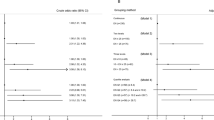Abstract
Purpose
Adequate caloric intake is associated with improved outcome in neurocritical illness, but factors influencing the provision of enteral nutrition (EN) have not been systematically evaluated. The primary goal of the study was to determine the EN intake of neurosurgical intensive care unit (ICU) patients within the first week of illness and investigate the factors contributing to achieving caloric goals.
Methods
A retrospective cohort of adult patients admitted to the neurosurgery service (NS) during August 2005–August 2006 were randomly selected and stratified into three groups based on their ICU-admission Glasgow Coma Scale Score (GCS) (GCS > 11, GCS 8–11, GCS 4–7). Daily EN intake, GCS, and other clinical data were collected.
Results
A total of 71 patients were included (GCS > 11 = 23, GCS 8–11 = 23, GCS 4–7 = 25). Admitting diagnoses included traumatic brain injury (TBI) (32%), subarachnoid hemorrhage (SAH) (32%), and intracerebral hemorrhage (17%). The overall in-hospital mortality was 23.9%. Overall, the maximum daily mean calories provided was 1,100 kcal (mean of 55% of caloric goal on hospital day 6). The median time to feeding was approximately 3 days in each group. GCS did not appear to significantly affect the mean % of caloric goal administered in patients with a minimum daily GCS ≤ 11 (P = 0.053). Multivariate analysis revealed that clinical care factors, such as time to EN orders and enteral access confirmation, were significant impediments to EN provision (P = 0.001).
Conclusion
System-based clinical care factors appear to have great impact on the successful provision of EN in the first week of neurocritical illness.



Similar content being viewed by others
References
Young B, Ott L, Yingling B, McClain C. Nutrition and brain injury. J Neurotrauma. 1992;9(1):S375–83.
Young B, Ott L, Twyman D, et al. The effect of nutritional support on outcome from severe head injury. J Neurosurg. 1987;67:668–76.
Grahm TW, Zadrozny DB, Harrington T. The benefits of early jejunal hyperalimentation in the head-injured patient. Neurosurgery. 1989;25(5):729–35. doi:10.1097/00006123-198911000-00007.
Taylor SJ, Fettes SB, Jewkes C, Nelson RJ. Prospective, randomized, controlled trial to determine the effect of early enhanced enteral nutrition on clinical outcome in mechanically ventilated patients suffering head injury. Crit Care Med. 1999;27(11):2525–31. doi:10.1097/00003246-199911000-00033.
Adams HP Jr, del Zoppo G, Alberts MJ, et al. Guidelines for the early management of adults with ischemic stroke. Stroke. 2007;38:1655–711. doi:10.1161/STROKEAHA.107.181486.
McCormic PC. Nutritional support after spinal cord injury. Neurosurgery. 2002;50(Suppl 3):S81–4.
ASPEN Board of Directors and the Clinical Guidelines Task Force. Guidelines for the use of parenteral and enteral nutrition in adult and pediatric patients. JPEN J Parenter Enteral Nutr. 2002;26(S1):1–138. doi:10.1177/014860710202600101.
Brain Trauma Foundation. Management and prognosis of severe traumatic brain injury. J Neurotrauma. 2000;17(6–7):457–627.
Winter TA, Bernard A, Magnuson B, Hoskins L, Nave B, Swintosky M. University of Kentucky adult nutrition support handbook. 2006. URL: http://www.hospukyedu/pharmacy/nss/NSS-manualhtml.
Brain Trauma Foundation. Management of severe traumatic brain injury. J Neurotrauma. 2007;24:S1–95. doi:10.1089/neu.2006.0209.
McClave SA, Sexton LK, Spain DA, et al. Enteral tube feeding in the intensive care unit: factors impeding adequate delivery. Crit Care Med. 1999;27(7):1252–6. doi:10.1097/00003246-199907000-00003.
Heyl D, Cook DJ, Winder B, Brylowski L, Van deMark H, Guyatt G. Enteral nutrition in the critically ill patient: a prospective survey. Crit Care Med. 1995;23(6):1055–60. doi:10.1097/00003246-199506000-00010.
Rapp RP, Young B, Twyman D, et al. The favorable effect of early parenteral feeding on survival in head-injured patients. J Neurosurg. 1983;58:906–12.
Borzotta AP, Pennings J, Papsadero B, et al. Enteral versus parenteral nutrition after severe closed head injury. J Trauma. 1994;37(3):459–68. doi:10.1097/00005373-199409000-00022.
Braunschweig CL, Levy P, Sheean PM, Wang X. Enteral compared with parenteral nutrition: a meta-analysis. Am J Clin Nutr. 2001;74:534–42.
Spain DA, McClave SAS, Leslie K, Adams JL, et al. Infusion protocol improves delivery of enteral tube feeding in the critical care unit. J Parenter Enter Nutr. 1999;23(5):288–92. doi:10.1177/0148607199023005288.
Author information
Authors and Affiliations
Corresponding author
Rights and permissions
About this article
Cite this article
Zarbock, S.D., Steinke, D., Hatton, J. et al. Successful Enteral Nutritional Support in the Neurocritical Care Unit. Neurocrit Care 9, 210–216 (2008). https://doi.org/10.1007/s12028-008-9120-9
Published:
Issue Date:
DOI: https://doi.org/10.1007/s12028-008-9120-9




